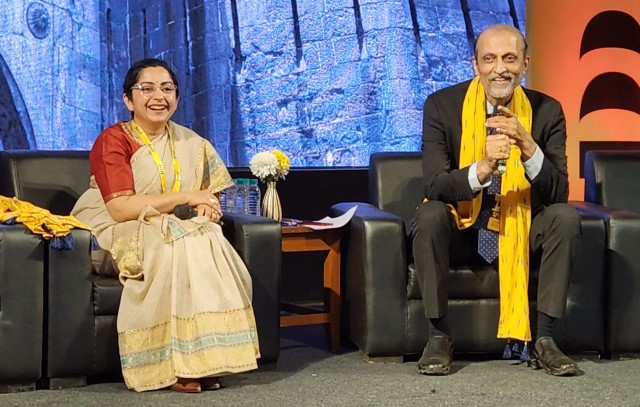PUNE: While designing the policies the policymakers must consider related evidence, opined Shamika Ravi, Member of the Prime Minister’s Economic Advisory Council while delivering the keynote address during the inaugural session of the first edition of the PPPF (Pune Public Policy Festival) at the Gokhale Institute of Politics and Economics. Sahil Deo has taken the lead in organizing this festival with support from the Parimal and Pramod Chaudhari Foundation.
She delivered a keynote address on ‘Catalysing Impactful Governance Though Evidence-Based Policy Making’ and touched upon aspects that affect the economy like pension schemes, extended maternity leave, skilling, and employment. After her keynote address Dr Ajit Ranade, VC, Gokhale Institute of Politics and Economics interacted with her on certain topics. Indranil Chitale presented the opening remarks and briefed the gathering about the thought behind organizing PPPF.
“While considering the cost of any welfare scheme apart from the actual accounting cost, its economic cost should also be considered. MNREGA is a good scheme and its usefulness came to light again during the pandemic. Though welfare schemes are meant for the benefit of poor people at large, we must check if we are in a position to afford them. A big chunk of the Government’s budget goes into taking up the interest cost and for making salaries and pension payments. Reforms brought in the pension scheme in 2003 made some funds available for developmental work. So, going back to the old pension scheme as demanded by some sections and backed by some political parties is not feasible“, said Shamika Ravi.
“Extension of the paid maternity leave has some positive side. However, the fact is that it has lowered the percentage of women in the workforce. As a result of this policy, SMEs are preferring to employ more male employees. Though every state has a policy, the progress made by each state is different and the factor of Governance plays a key role there. There was a time when Punjab’s GDP was the highest which declined due to heavy deindustrialization. Thus, questions like how the new jobs will come in the future need to be answered, she added.
Shamika Ravi stated that while facing the government job psychology we must understand that the private sector has a huge potential to create new jobs. The current findings indicate that unemployment is higher in the highly educated section of youngsters as compared to the ones that are not so highly educated. This is primarily because of the gap between the skills required by the industry and the perception of the right job amongst the highly educated youth. In India, unemployment is as high as 34.8% among the youth who possess graduate and above degrees. She advised the students of economics to study the open source data and use it in research.
After the inaugural session a panel discussion on Reimagining Urban Transformation – The Trade-off between Environment and Development. PCMC Municipal Commissioner Shekhar Singh, PWC India’s partner Shardul Phadnavis, Greater Mumbai’s Additional Municipal Commissioner Ashwini Bhide, Bandu Dhotre, and Ambika Vishwanath participated in this panel discussion.
Photo caption – Dr Ajit Ranade, VC Gokhale Institute interacted with Shamika Ravi during the inaugural session of the Pune Public Policy Festival at Gokhale Institute.

